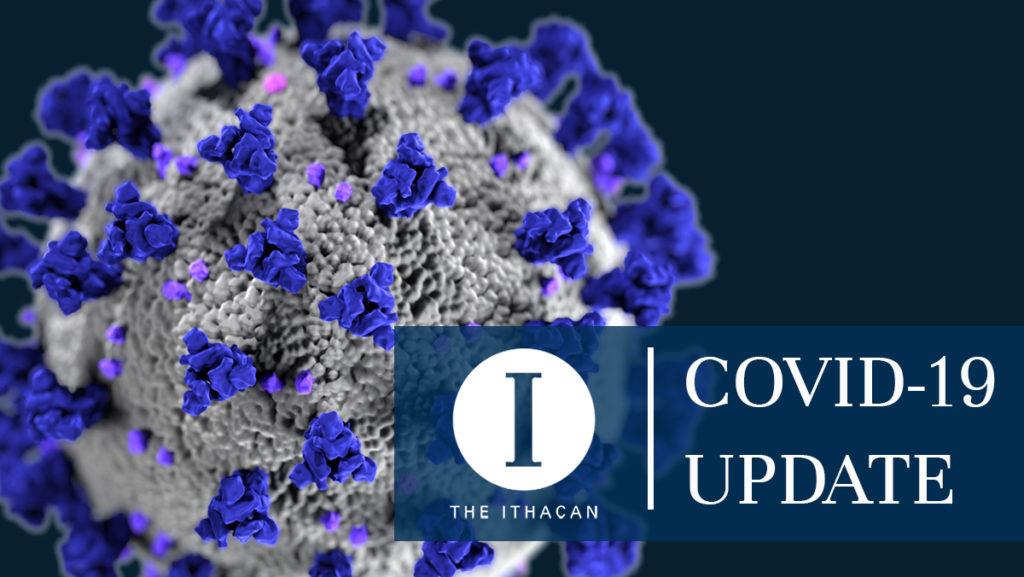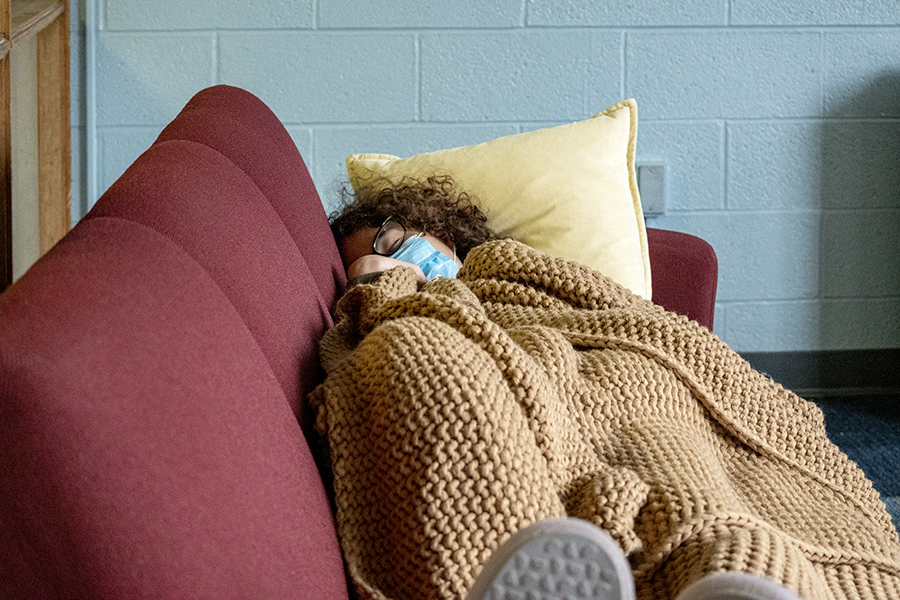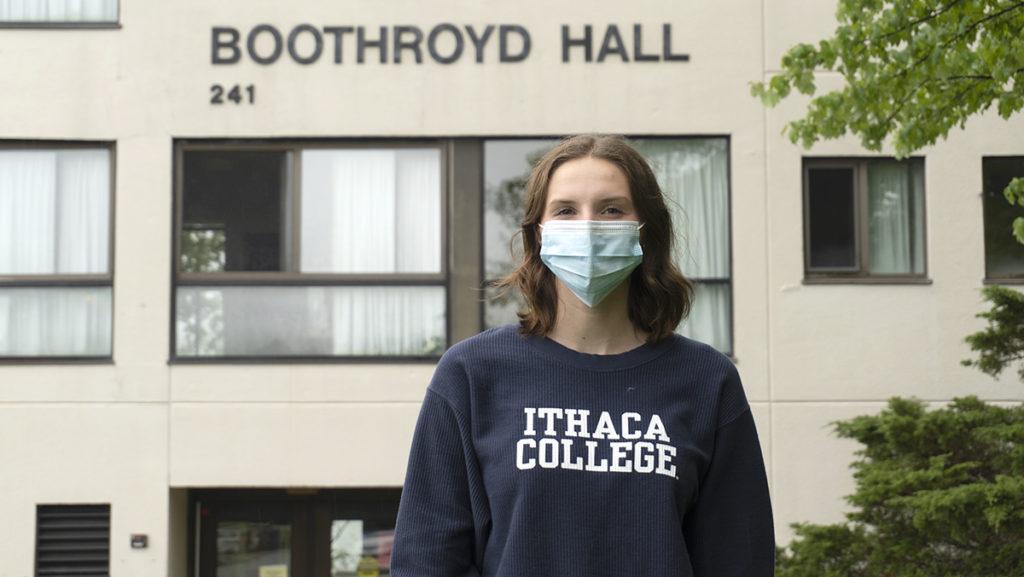Ithaca College will not require students to receive the primary series of COVID-19 vaccinations beginning in the 2023–24 academic year.
Samm Swarts, assistant director of Emergency Preparedness and Response, alerted the campus community of this change in an email March 22. However, the college is still strongly encouraging the campus community to stay up to date with their COVID-19 vaccinations despite ending the requirement.
“Staying up-to-date with vaccines continues to be an important way to minimize the risk for contracting severe symptoms resulting from this illness,” Swarts said. “I also urge members of our IC community to continue your commitment to making proactive good public health behaviors and practices part of your daily routine.”
Senior Cali Trainor said her first thought after seeing the announcement was that she is glad she is graduating this year.
“I feel really sad for everyone else who’s gonna have to stay and deal with it,” Trainor said. “I have already been struggling feeling safe on campus. And I just can’t imagine how much worse it’s gonna get now that vaccinations won’t be required.”
Trainor is immunocompromised and said she also has many friends on campus who are as well.
“If vaccines aren’t required, what [is the college] doing to protect us because it kind of feels like there’s nothing now,” Trainor said. “It feels like the last step and [the college] is saying that it’s over, the pandemic is over and it’s not and it’s disheartening.”
Junior Kiara Valera said she was already upset that the college did not require the booster vaccines for COVID-19 because students are gathering in large groups without masks. Now, with the mandate for primary vaccines being discontinued, she said she feels like the college is taking steps backward.
“I’m just really disappointed,” Valera said. “The school has always done something where I’m like, ‘We’re not working for the students’ … and I don’t know if they understand that the point of having these vaccines is to care for people who are immunocompromised.’”
Valera began her time at the college online, during the height of the pandemic, and said the challenges she experienced make it even more frustrating to see these vaccination policies end.
“The fact that we’re not requiring this now, it feels like I’m being really disrespected,” Valera said. “Especially when we literally gave up a year because we couldn’t be on campus.”
In the email announcement, Swarts said there was an extensive evaluation conducted with public health experts and the President’s Cabinet. Swarts said Tompkins County Whole Health was consulted but was not actively involved in the evaluation process. Whole Health Commissioner Frank Kruppa said the necessity for requiring vaccines is lower than at the beginning of the pandemic.
Although the college is no longer tracking active COVID-19 case numbers, Swarts said only one positive test had been reported at the on-campus testing site in Muller Faculty Center since March 1.
“Throughout the pandemic, we’ve worked closely with all of our higher education partners, including Ithaca College, related to decision-making around COVID,” Kruppa said. “And the decision for Ithaca College to no longer require COVID vaccines beginning next academic year is something we were in communication with them and support their decision making.”
Swarts said via email that the college began evaluating its remaining COVID-19 policies in January and reviewed data from the Centers for Disease Control and Prevention and the latest studies on the effectiveness of the vaccines.
“When we look at the latest scientific evidence on the effectiveness of the COVID vaccines, the newest data is not clear or concise on whether the vaccines stop or slow the spread of the virus like originally thought at the beginning of the vaccine rollout,” Swarts said. “ However, one thing is still clear: the vaccines significantly reduce the severity of the disease if one gets infected.”
Swarts said this change is consistent with the series of changes in the 2022–23 academic year as COVID-19 risks have decreased. While COVID-19 cases and hospitalizations remain low, there was a spike in January that caused Tompkins County to shift its CDC COVID-19 Community Level from low to medium Jan. 19 because of an increase in cases and hospitalizations. The Community Level is currently at low, but the dashboard does not display when the shift back to low was made.
As of March 17, the Tompkins County COVID-19 Dashboard reported four active COVID-19 hospitalization cases and as of March 18, 38 positive cases in the past seven days. In the county, 84% of the population is fully vaccinated with the primary series.
On Dec. 23, the college ended the use of Boothroyd Hall as an isolation space and students were told to isolate in their residence rooms. Also on that day, the college discontinued the COVID-19 Dashboard, which was implemented at the start of the COVID-19 pandemic to track case numbers. The COVID-19 absence status for employees ended Jan. 2, which means if employees of the college tested positive for COVID-19, they would need to use their allotted paid time away. Employees no longer have to complete a self-reporting form with documentation of a positive test either. On Feb. 6, testing for COVID-19 moved to Muller Hall and continues to be the location for those seeking testing services.
All current policies are posted on the COVID Health & Safety page on the college’s website.
Sophomore Abigail Jones said via text that while she was initially concerned, the process the college took to make the decision about vaccination requirements eased her worries.
“I think I was a bit worried about the COVID vaccine mandate being lifted at first because getting the first round of vaccines is very important,” Jones said. “Mandates had to be in place for a long time for everyone’s safety and to lessen symptoms. Although I’m not an expert myself, I also realize some time has passed and the rationale given in the email makes sense to me. I also understand the decision was made with the Tompkins County Health Department, which makes me feel a bit better.”
Swarts also provided a list of factors that contributed to the decision in the email announcement. The email stated that because of vaccinations or previously contracting COVID-19, the majority of the campus community has some immunity. The email from Swarts also said the current strains of the virus that are most common have symptoms that are milder. The status of COVID-19 as a national emergency and public health emergency is set to expire May 11, which Swarts said was also taken into consideration when making the decision about vaccination requirements at the college.
“Please note that the decision to remove the COVID-19 vaccine requirement for students is another important milestone for our campus as we continue to strategically transition our college operations to pre-pandemic standards,” Swarts said.
Kruppa said to his knowledge that other colleges and universities in the county have not yet made decisions about their vaccination policies for the 2023–24 academic year. However, some higher education institutions have made similar decisions about vaccines as Ithaca College in other regions. Beginning March 1, Hartwick College lifted its requirement for vaccinations that applied to students, faculty and staff. Columbia University is scheduled to end its COVID-19 vaccination mandate May 11, in accordance with the planned end to the national health emergency. Fordham University will end its mandate May 15 and more colleges everywhere are easing up on their vaccination policies.
A September 2022 survey by the American College Health Association found that college students are more likely to receive the primary COVID-19 vaccines than adults and found the difference was in part linked to institutional requirements. According to the survey, 43% of students said the college they attend had a COVID-19 vaccine requirement; 18% said the requirement caused them to get vaccinated; and 80% of student respondents said they felt safer attending institutions with vaccine mandates.
“I would suspect that more and more colleges will continue to make decisions that are similar to Ithaca College’s,” Swarts said.











